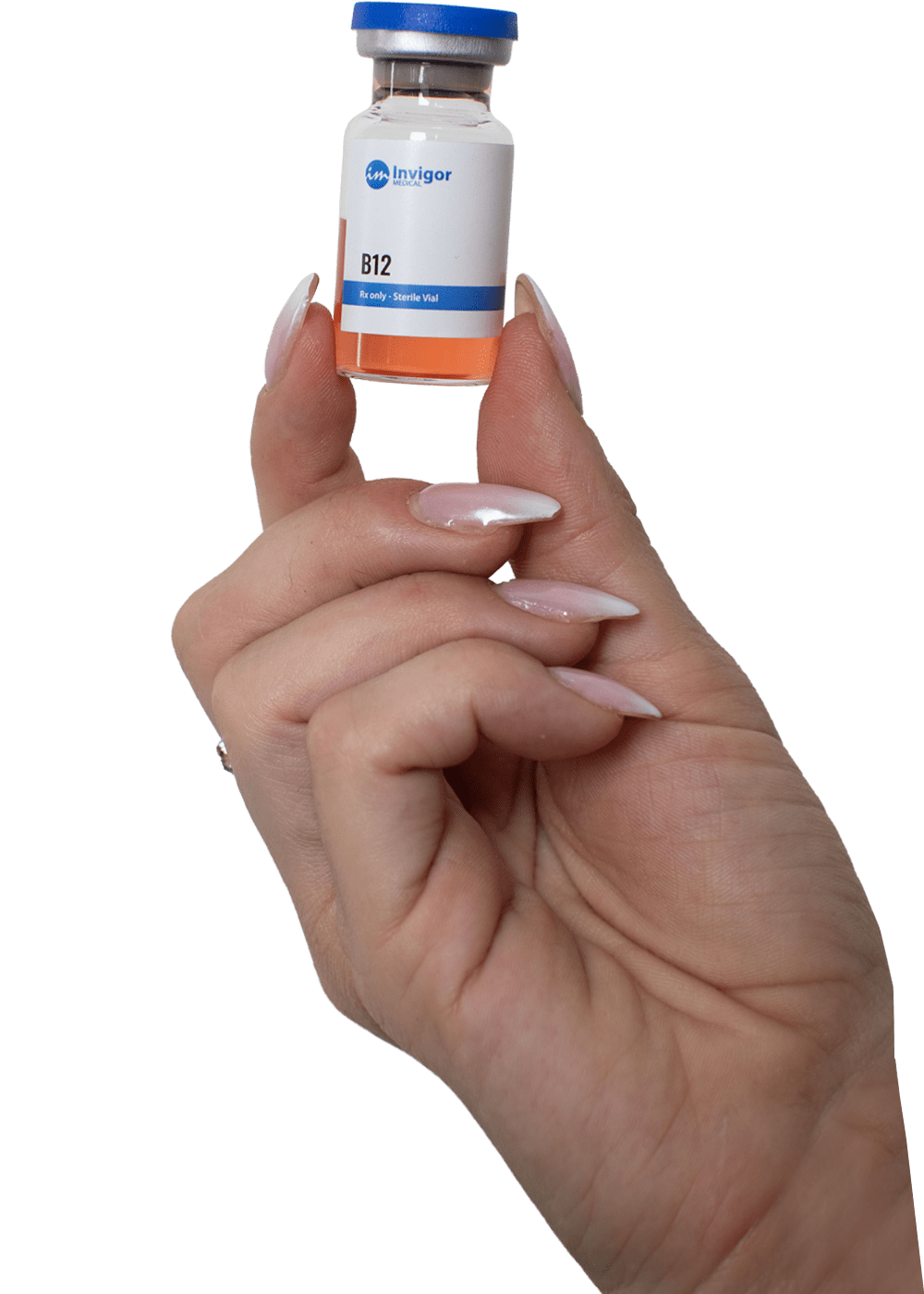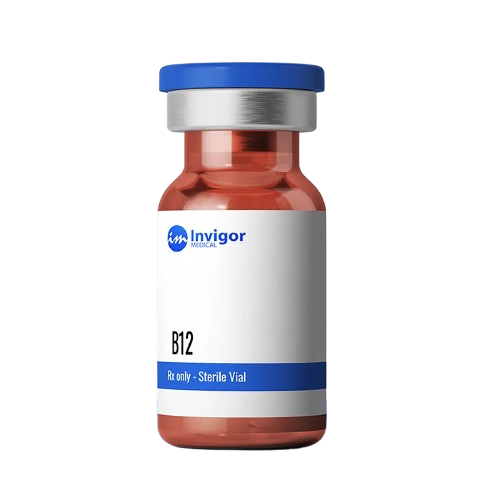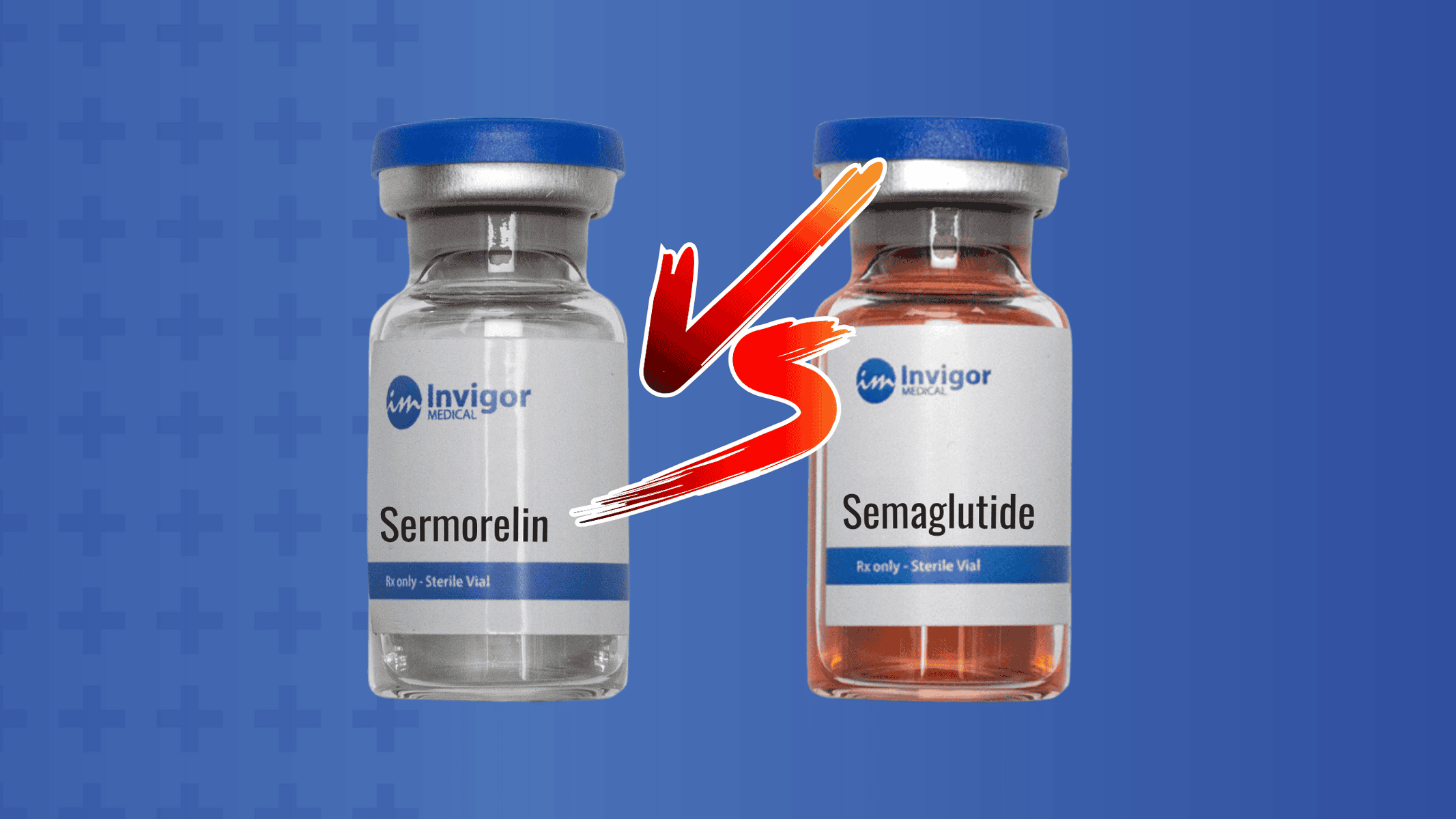Compounded semaglutide with B12 fills the gap between the enormous demand for anti-obesity medications and the ability of pharmaceutical manufacturers to meet the demand. Compounded medications can be personalized to meet the needs of individual patients. Many compounding pharmacies compound semaglutide with B12 to boost energy and combat some of semaglutide’s known side effects, including nausea and vomiting.1
Nausea and vomiting are the top reasons people stop taking semaglutide, whether to treat type 2 diabetes or obesity. In this 2018 study, researchers reported that conjugating B12 to GLP-1 agonists such as semaglutide blocks these drugs from entering the part of the brain that triggers fatigue and nausea.2
Table of Contents
Semaglutide: A Powerful Weight Loss Tool
Semaglutide is a glucagon-like peptide-1 (GLP-1) agonist that was initially approved as a treatment for type 2 diabetes. It helps regulate blood sugar levels by stimulating insulin release from the pancreas and reducing glucagon secretion.
In addition to treating type 2 diabetes, semaglutide is a treatment for obesity. It mimics the effects of GLP-1, a hormone naturally produced and released from your intestines after consuming a meal. GLP-1 hormone binds to receptors throughout the body. GLP-1 receptors are found on pancreatic beta cells to release insulin and lower blood sugar. GLP-1 agonists bind to their receptors on the stomach lining to slow stomach emptying, which leads to feelings of fullness. GLP-1 receptors are also found in the kidney, heart, and hypothalamus, a part of the brain that regulates satiety, food cravings, and hunger.3
Semaglutide is a weight-loss medication for people with or without diabetes.
The Vital Role of Vitamin B12
Vitamin B12, also known as cobalamin, plays a crucial role in various bodily functions. It supports brain function, including memory and mood, immune system health, DNA production, and oxygen transport throughout the body by maintaining red blood cell health.
Vitamin B12 is essential to convert carbohydrates from your diet into energy that your body can use. A reduced-calorie diet can increase fatigue. Vitamin B12 supplementation can improve carbohydrate usage and energy levels in people with vitamin B12 deficiency.

The Benefits of Compounded Semaglutide with B12
Compounded semaglutide with B12 offers a range of benefits beyond weight loss and blood sugar control. Let’s explore some of these potential advantages:
1. Physical Functioning
Weight loss can improve physical function and mobility. People taking semaglutide for weight loss experience an improved quality of life as they become more physically mobile and increase their physical activity throughout the day.5
2. Inflammation
Carrying excess adipose or fat tissue leads to increased inflammation. Chronically elevated inflammation can increase your risk of cardiovascular disease, abnormal lipids, type 2 diabetes, high blood pressure, and metabolic syndrome.6 Compounded semaglutide with B12 can induce significant weight loss and reduce inflammation.
3. Mental Health
Obesity is associated with mental health conditions such as anxiety, sleep disorders, low self-esteem, depression, and eating disorders. Widespread beliefs that obesity and overweight are due to a lack of personal willpower contribute to weight stigma and discrimination. This increases the risk of mental and physical health conditions.5,7 Obesity is a chronic disease, and compounded semaglutide with B12 is an effective treatment for this disease.

4. Satiety and Cravings
Semaglutide can improve craving control and enhance mood. Those taking semaglutide can experience reduced cravings for both savory and sweet foods compared to those not taking the medication.5
5. Cardiovascular Benefits
Cardiovascular health is a critical aspect of overall well-being. Semaglutide has shown cardiovascular benefits by reducing the risk of major adverse cardiovascular events in people with or without type 2 diabetes. These benefits include a 20% lower risk of heart attacks, strokes, and cardiovascular-related deaths over 40 weeks.8 Semaglutide use also resulted in significant fat loss and improved body composition.
6. Sleep Apnea
Obstructive sleep apnea is a serious condition that can cause you to pause your breathing at night. This can reduce your lung function and interrupt your sleep. Obesity and overweight are associated with an increased risk of sleep apnea. Excess fat tissue in the face and neck can compromise your airway at night when your muscles are more relaxed.
Semaglutide can reduce body weight and, therefore, reduce the risk of sleep apnea. Researchers have found that obstructive sleep apnea is also associated with lower GLP-1 levels.9 Semaglutide, a GLP-1 receptor agonist, works just like natural GLP-1 in your body. Increasing GLP-1 can induce weight loss and potentially reduce the risk of sleep apnea.
How to Use Semaglutide and B12 Compound
Using compounded semaglutide with B12 is a straightforward process. Here are the key steps to follow:
1. Administration
Semaglutide compounded with B12 is administered as a subcutaneous injection. The recommended starting dose is typically 0.25 mg subcutaneously once a week. After one month of treatment, the semaglutide dosage may be increased to 0.5mg once a week if needed, up to a maximum dose of 2.4 mg. It’s essential to follow the instructions provided by your healthcare provider and ensure proper injection technique for optimal results. If you have questions about dosage, a missed dose, or how to inject semaglutide, contact your healthcare provider.
2. Lifestyle Modifications
To maximize the benefits of semaglutide compounded with B12, it’s crucial to incorporate lifestyle modifications. This includes adopting a nutritious, reduced-calorie diet and maintaining regular physical activity. These lifestyle changes, combined with semaglutide’s ability to regulate appetite, reduce cravings, and quiet food noise, can lead to substantial weight loss.
3. Ongoing Monitoring and Support
Regular monitoring and follow-up appointments with your healthcare provider are essential throughout your compounded semaglutide and B12 treatment journey. They will assess your progress, adjust dosages if needed, and provide guidance and support to help you achieve your weight loss and glycemic control goals.

Considerations and Side Effects When Taking Semaglutide B12 Compound
While compounded semaglutide with B12 offers numerous benefits, it’s essential to be aware of potential side effects and considerations. Here are some important points to keep in mind:
1. Nausea and Gastrointestinal Distress
Nausea, vomiting, diarrhea, stomach pain, and constipation are the most commonly reported side effects of semaglutide. These symptoms are typically mild to moderate in intensity and tend to improve over time. If you experience persistent or severe side effects, it’s important to consult your healthcare provider for further guidance. You may need to decrease your semaglutide dose or change to a different medication.
2. Hypoglycemia and Kidney Problems
Individuals at risk of hypoglycemia or with pre-existing kidney problems should exercise caution when using semaglutide B12 compound. Close monitoring of blood sugar levels and kidney function is crucial to ensuring safety and optimizing treatment outcomes.
3. Allergic Reactions
While rare, allergic reactions to semaglutide or B12 are possible. If you experience symptoms such as rash, itching, difficulty breathing, or swelling of the face, lips, tongue, or throat, seek immediate medical attention.
4. Other Potential Side Effects
Other potential side effects of semaglutide compounded with B12 include fatigue, indigestion, excessive gas and sulfur burps, and injection site reactions. Gallbladder disease and pancreatitis can occur in some people at increased risk of these conditions. Semaglutide also carries a boxed warning for thyroid tumors. This rare side effect was noted in animal studies, but whether humans also carry an increased risk is unclear. If you have a history or a family history of medullary thyroid cancer or multiple endocrine neoplasia (MEN) type 2, you should not take semaglutide.
Conclusion
Compounded semaglutide with B12 offers a personalized and effective solution for weight loss and blood sugar control that also reduces the risk of cardiovascular disease in people with overweight and obesity. By harnessing the power of semaglutide’s weight-loss potential and the fatigue and nausea-reducing properties of vitamin B12, semaglutide compounded with B12 shows great promise in helping people who have overweight or obesity achieve their weight-loss goals and improve their health.
It’s crucial to work with a knowledgeable healthcare provider when taking semaglutide, undergo regular monitoring, and adopt lifestyle changes to optimize compounded semaglutide with B12’s weight loss benefits and reduce potential side effects.
If you have a body mass index (BMI) of 30 or higher or have a BMI of 27 or higher along with a weight-related medical condition and are interested in learning more about the potential benefits of semaglutide for weight loss and cardiovascular health, contact an Invigor Medical treatment specialist to get compounded semaglutide with B12.










